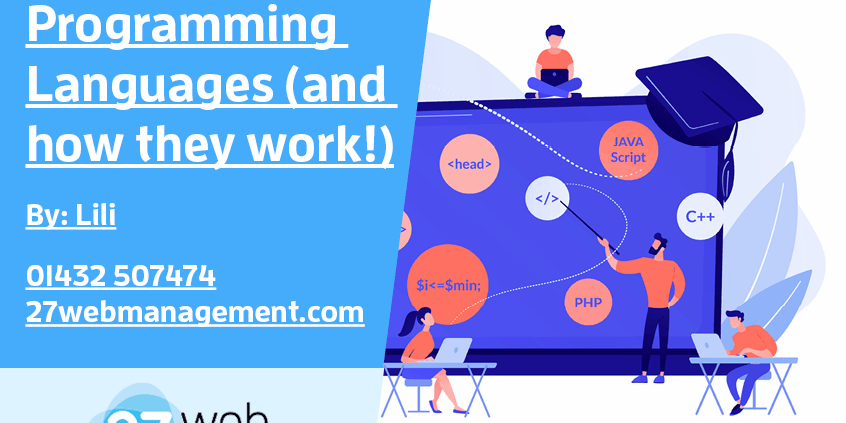What is a programming language?

A programming language is “…a computer language programmers use to develop software programs, scripts, or other sets of instructions for computers to execute.” Each programme has its own syntax, which refers to words and spelling of key terms the programmer inputs into the specific programming language to carry out the different programme functions. A programmer will write the source code which will be compiled into machine language that can be understood by a computer. If the programme is in a script language, then an interpreter will be used to execute the script.1
Different Programming Languages
Low-Level Programming Languages
Low-Level Programming Languages are also known as computer-friendly languages as they’re very close to machine code. Low-level Programming Languages can be the hardest for humans to understand and programmers need a vast knowledge of computer architecture.

Machine Language
Machine Language is also known as First Generation Programming Language and is the fastest Low-Level Programming Language. As a computer is a group of millions of switches which can either be switched ON or OFF at a very high rate, the computer understands ON and OFF as 0s and 1s, and so Machine Language is only in 0s and 1s. This type of code doesn’t need to be converted and is directly readable by the computer.
Assembly Language
Assembly language is also known as Second Generation Programming Language. Assembly Language is slower compared to Machine Language as it needs a program called Assembler to convert its code into Machine Code and could be considered easier to understand than Machine Language.
High-Level Programming Languages

High-Level Programming Languages are also known as Human/Programmer-Friendly Languages. To run programme written in a High-Level Programming Language, a compiler or interpreter is needed to convert the code to the Low-Level Language. Most programmers will use High-Level Programming Languages as they are the easiest to understand and interpret.
Procedural-Oriented Programming Language
Procedural-Orientated Programming is also known as Third Generation Programming Language. As one of the earlier models of High-Level Programming Languages, instead of focussing on data, Procedural-Orientated Programming Languages focus on the procedure of a programme to solve a problem. Several statements are created to solve the problems in a Top-Down approach and the order needs to be maintained at every step/statement, making use of functions.
Object-Oriented Programming Language
Object-Orientated Programming Language uses Classes and Objects for creating a programme. Every problem is viewed as an object. “Some of the basic concepts of Object-Oriented Programming are Object, Class, Inheritance, Abstraction, Polymorphism, and Encapsulation.”
Functional Programming Language
Functional Programming Language treats functions just like variables, and so Functional programming Language is also known as First-Class Function. The data is immutable, which means once it’s created it can’t be changed, so a new variable must be created instead of changing the old one. Functional Programming Language keeps data separate from the function.
Problem-Oriented Programming Language
Problem-Orientated Programming Language is also known as Forth Generation/Result Orientated Programming Language. By directly inserting or retrieving the result or data, there’s no need to get into the complexity of the procedure of programme- the priority is data only.
Scripting Programming Language
Scripting Languages are Run-Time Programming Languages, used for performing automation/repetitive tasks by using scripts. Web automation or Web Scripting is one of its applications.
Artificial Intelligence Programming Language
Artificial Intelligence Programming Language is also known as Fifth Generation Programming Language, or Natural Language. The code is written in full sentences, so even a non-programmer can instruct a computer what to do and the computer will carry out the task by itself.2
References
1Computer Hope. (2021). Programming language. Available: https://www.computerhope.com/jargon/p/programming-language.htm . Last accessed 15th Oct 2021.
2The CoderPedia. (2020). Types of Programming Languages (Complete List with Examples). Available: https://www.thecoderpedia.com/blog/types-of-programming-languages/ . Last accessed 15th Oct 2021.






